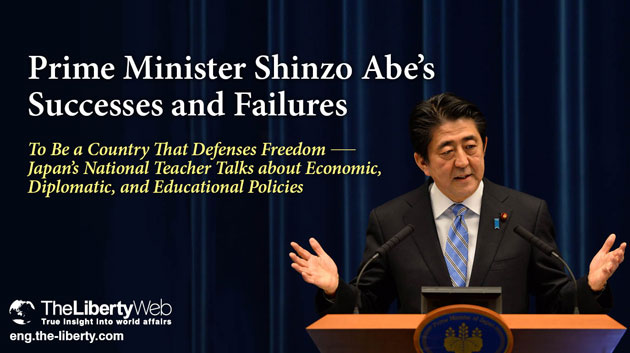Prime Minister Shinzo Abe’s Successes and Failures
To Be a Country That Defenses Freedom ― Japan's National Teacher Talks about Economic, Diplomatic, and Educational Policies
After the second Cabinet reshuffle, intensifying media reports rapidly drove Prime Minister Shinzo Abe to dissolve the Lower House. Despite that, he has successfully advanced his foreign policy to build up Japan’s national defense, but there is no doubt that his economic policies have come to a deadlock. Prior to the dissolution, Master Rhuho Okawa looked back on the merits and demerits of the Abe administration. In a Q & A session, he talked about how Japan’s citizens should think to bring further prosperity to Japan.
Prime Minister Abe Should Have Waited for Natural Growth in the Tax Revenues
Master Okawa indicated early on the risk of a hike in consumption tax. Regarding the economic stagnation due to the consumption tax increase in April, he said that “Abenomics” and fiscal rehabilitation were contradictory from the very beginning, and to pursue these two goals was like running after two hares.
Also, Master Okawa explained that the idea of fiscal discipline coming first, a policy that Germans have taken the initiative to role out in EU, contains errors. He pointed out how Prime Minister Abe should have had the patience to wait for the increases in the tax revenues that economic recovery naturally brings.
Master Okawa also discussed in detail why the third arrow of Abenomics, that is, growth strategies to energize the private sector, has resulted in an impasse.
Then, in response to a question about national defense and security, Master Okawa gave P.M. Abe some credit for having done a creative job in hampering China’s expansionism in a relatively-short period of time.
On the other hand, the Chinese President Xi Jinping, who the world sees as a threat to Asia, is said to be an advocate of Legalist Thought. An increasing number of laws have been enacted in Japan, too, each year that Prime Minister Abe has been in office, so Master Okawa pointed to the relationship between the laws of man and the concept of freedom through the use of specific examples.
The Actual Cause of Japan’s Sluggish Economy
Next, an audience member raised a question about economic policy. The Bank of Japan (BOJ) launched an additional monetary easing measure in October, which boosted stock prices. However, Master Okawa expressed his doubts that the economy will not recover entirely because that growth strategy has resulted in a misfire.
Concerning the current situation of Japan’s economy, Master Okawa especially noted that the sluggish bank stock prices, which are the backbone of the industry, have become a problem. He identified the cause of the problem, stating that the Japanese public has been deceived a lot from the term, “global standard.” Furthermore, based on the trends of the global financial industry from the 1990s onward, Master Okawa clarified the real reasons for Japan’s unstable economy, and he clearly showed ways to reinvigorate Japan’s flagging economy.
Master Okawa also mentioned that although the Abe administration has promoted greater participation from women in the labor force, it has had a tendency to apply the quota system to economic issues, which has shown a leaning somewhat toward state socialism.
In this lecture, Master Okawa provided an overview of topics in a wide range of fields such as politics, the economy, and diplomacy. He focused on Abe’s handling of the government over the past two years, pointing out the problems and clearly showing the future direction Japan should take.
Every Japanese citizen should hear this lecture before voting in the Lower House election.



















